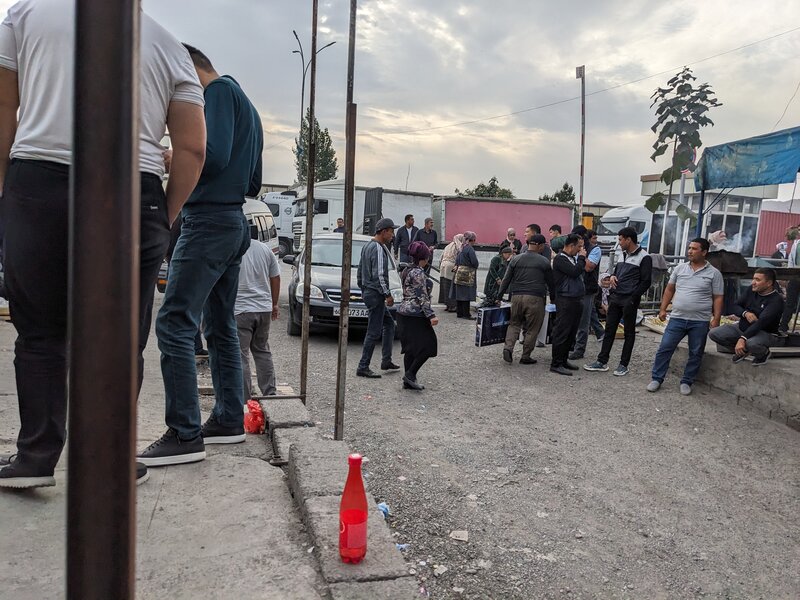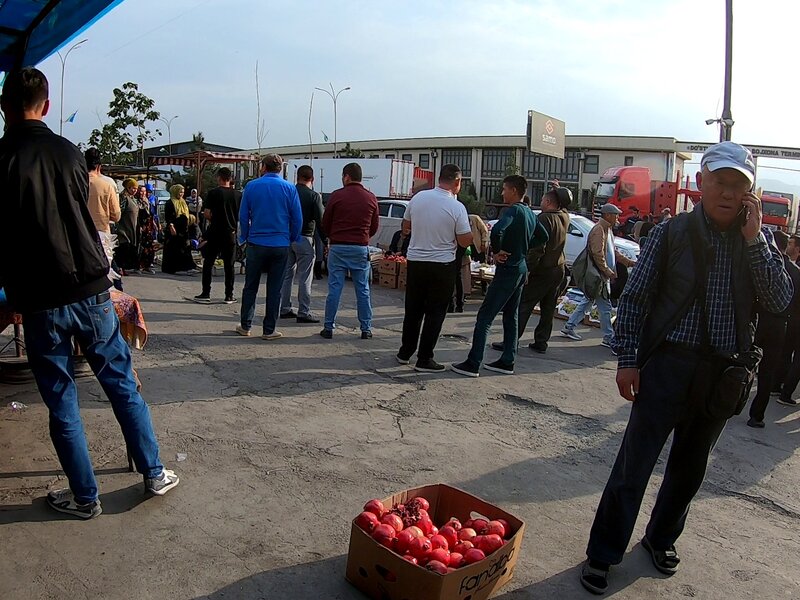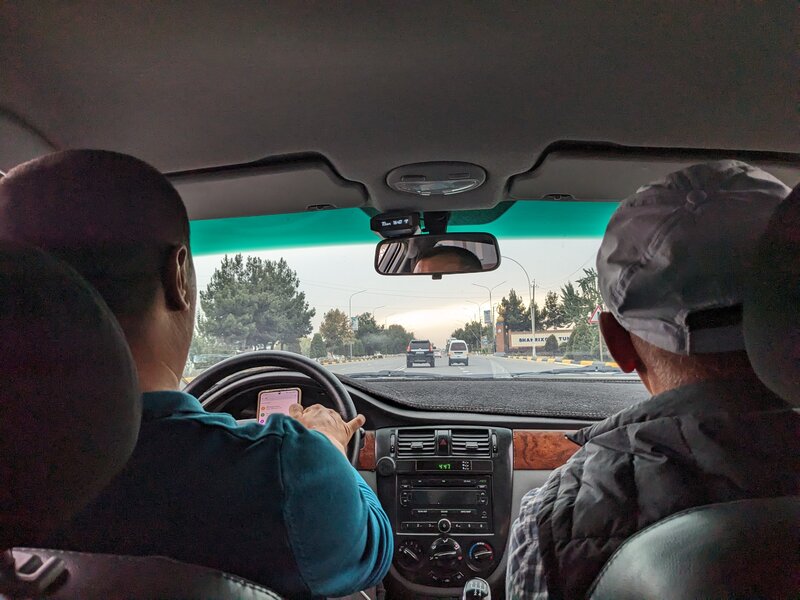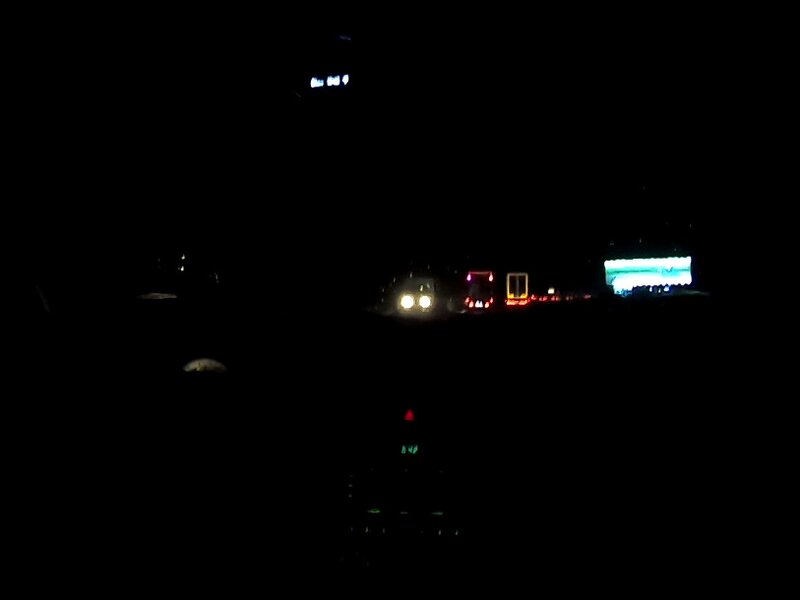Leaving Kyrgyzstan behind in a haze, I kept walking down the narrow passage toward the passport control and joined a long line of people. We just stood there for a while, staring at the closed doors of the building guarded by soldiers. Everyone seemed to be locals traveling between the borders, and many of them were families. I was definitely the odd one out, standing alone with my backpack topped with a baseball cap. After a while, a soldier opened the door to the Kyrgyz passport control building, and everyone was let into the compact area where we lined up once again. Standing in line, I thought back on my short stay in Kyrgyzstan. When I’d arrived in Xinjiang with the faint hope of crossing the mountain border into Kyrgyzstan and beyond, I hadn’t known if it would even be possible. But with the help of countless strangers, not only had I made it to Kyrgyzstan, but I was also now crossing into Uzbekistan. It felt like real progress, though I couldn’t afford complacency–nothing was certain. I still didn’t know my next moves, even if I reached Tashkent by evening. I kept trying to come up with a plan, while merry children ran around everywhere in that crowded immigration building.
When it was my turn to walk up to the immigration window, a friendly yet tight-lipped officer looked through my passport with interest. He remarked, “Australia?” When I replied affirmatively, all he jokingly said was, “Kangaroo, yes?” Terrific conversationalist that I am, all I managed to say was, “Yes, we have them.” After my passport was stamped, I headed down yet another long and narrow passage to the Uzbekistan checkpoint. On the way, there was a huge group of Uzbek or Kyrgyz babushkas with luggage stacked high against the fences behind them. They were chatty, many of them sitting on bags or cardboard boxes. The mountains of luggage were easily several times the size of all the babushkas themselves, and I wondered how they’d move all that baggage to wherever they were headed. Everyone at that border seemed to have their own unique, untold tale. Who were those babushkas sitting on the ground? Who was the mother in front of me, trying to watch four children simultaneously while talking to the customs officer? Who was the guy that got into a scuffle with an Uzbekistan soldier and got escorted away? I would never know.
After the border crossing, I marched into Uzbekistan with the intention of not wasting any time and heading to Tashkent as quickly as possible. The Uzbekistan side of the border, known as Dustlik, was just as chaotic as the Kyrgyz side. There were many street vendors selling fruits and miscellaneous foodstuffs, and drivers trying to win over the customers. Their chorus of “To-shkent!” resounded through the clamor of the crowded street. On the left was a main road where trucks continued to raise dust and leave behind fumes as they dragged their heavy cargo into Uzbekistan proper. I checked my phone, and it was almost three o’clock.
I stopped to talk to a few drivers to see what the going rate was and learned that the fare was 200,000 Uzbekistan sum per person. I tried to haggle it down to 150,000 sum but everyone just laughed and said it wasn’t possible. Little did I know that saving a few thousand sum was the wrong thing to focus on. A more important thing was to find a driver that could leave soon, because the cars would only leave once the driver found four people that could fill all the seats. Missing this crucial detail, I ignored the ones that pleaded with me that they could leave right away if I joined and instead struck a deal with a driver who agreed to come down to 180,000 sum. We shook hands, and the driver led me to his car which was parked just downhill from the main area, with a random tire sticking out of the half-closed trunk. No one was in the car. I took an empty backseat and waited alone for around twenty minutes, naively assuming that we were going to leave soon. After a while, I started feeling that something was off about just sitting there–plus, I wasn’t getting any Internet in that area. So I went back to the main area to see what the drivers were up to.
At this chaotic Uzbek border, you needed your driver as much as the driver needed you. You wanted your driver to hustle and fill all the seats quickly to be on the way. But my driver wasn’t really trying hard. Everyone was diligently shouting “To-shkent!” and he seemed to be just standing around and staring at the oncoming pedestrians. At least, I thought he was–at this point, I had talked to so many drivers to bargain that I actually forgot who exactly I went with. Since I needed to get going soon, I started talking to other drivers to jump ship. But they weren’t as enthusiastic as when I first talked to them, and surprisingly no one would take my 200,000 sum. It seemed that, in Dustlik’s free-for-all, at least one small unwritten rule prevailed: don’t poach passengers from another driver.
Nothing was going my way since arriving in Uzbekistan. I wasn’t anywhere close to leaving the border, and the 400km (250mi) trip to Tashkent hadn’t even begun. What made matters worse was that I was slowly coming down with something. The trials of the cold autumn night in the mountains must have taken a toll on me, especially after surviving on nothing but Uyghur bread and not getting much rest. I really couldn’t afford to be sick, with only fifteen days left to reach Dublin. The mere thought of falling ill terrified me. After all I had been through, it would have been devastating or even comical to forfeit my goal because I randomly got sick. But there was no time to keep worrying because I also had to plan what to do when I got to Tashkent. I sat down on the unkempt sidewalk and tried unsuccessfully to do some planning on an extremely slow Internet connection while it rapidly drained the little battery I had left. The ground was rugged and dirty and sitting on it was surely going to ruin my only pair of sweatpants, but I didn’t care anymore. I was just too exhausted and hungry. I should have taken the offer to have lunch with Elhan and his brother.

Exhausted, sick, hungry, and stuck at the border, I just sat down hopelessly on the corner of the disheveled road.
Resting uncomfortably on the disheveled roadside, I looked at the passersby, the drivers, the street vendors, the trucks, and the dust that surrounded them. Everyone was walking busily to where they were supposed to go, and I had no idea where I was going. I was hungry, but I didn’t want to risk eating at the fishy restaurants near the border right before the trip. The last thing I needed was a toilet emergency during a multi-hour car ride with several passengers. So I just nibbled on my Uyghur bread, which was somehow still lasting since Kashgar, and stared at the disorienting hubbub of Dustlik’s main road.
My daze was interrupted when I noticed that all the drivers, including mine, were surrounding a man and trying to negotiate the fare. After loud bargaining with a lot of gesticulation, my driver started walking the man down the hill to the desolate parking lot where our vehicle was. Excited by seeing a second passenger, I followed them to the car to ask the man where he was going. By the time I reached the parking lot, the man was settling into the front seat. “Privet,” (“Hello”) I greeted him, and we started talking in Russian. He introduced himself as Vyacheslav and said that he was on his way home to Tashkent after visiting Kyrgyzstan. He looked eerily like a regular Korean grandpa you might see on the streets of Seoul.
“A zachem ty v Tashkent edesh’?” (“So, why are you going to Tashkent?”) Vyacheslav casually asked while puffing away at a cigarette. “Nu, ya koreyskiy” (“Well, I’m Korean”), I started by announcing that in the hope of learning whether he too was Korean, “i ya khotel posmotret’, kak koreyskiy zhivut v Uzbekistane” (“And I wanted to see the lives of Koreans in Uzbekistan”). Vyacheslav didn’t really seem to care about my ethnicity. “Nu, tam koreytsy mnogo zhivut v Tashkente” (“Well, there are so many Koreans living in Tashkent”). And he continued, “I mnogiye v Koreyu pereyekhali tozhe. Vot u menya dochka v inchon zhivyot seychas” (“But many have moved to Korea as well. In fact, I have a daughter living in Incheon now”). He said that in fluent Russian but repeated part of the sentence in a strange language. It took me a second to understand what was going on. Vyacheslav was mixing some Korean into his Russian–code-switching, just like I do when talking to Korean friends in English. His Korean part sounded rather unusual, but I could still decipher the words that he was articulating.
“Hanguk-eo hasil su isseuseyo?” (“Can you speak Korean?”) Amazed, I exclaimed to Vyacheslav in Korean. But my excitement was unmatched by Vyacheslav’s laid-back attitude. He simply shrugged it off and said that there are many Koreans in Tashkent. He made it seem like it was really no big deal to meet Koreans in this part of the world. After a bit of chatter, I climbed back up to the main road to get some Internet connection for planning. But, in the middle of all the commotion and on the world’s slowest Internet, I just couldn’t make a good decision. I kept going back and forth between the car and the main road without making much progress. There was no sign of additional passengers, either.

Vyacheslav talking on his phone about leaving. This was either going to be one hell of a setback or an opportunity.
It was already five o’clock, and the evening sun had begun casting long shadows across the shabby pavements of Dustlik. With no transport, no plan, coming symptoms of a cold, and a seemingly improbable itinerary, I sat and just watched the sun go down, stretching the shadows of all that was happening. It went on like that until, suddenly, Vyacheslav came back up to the main road and started having a loud conversation with the driver. He sounded frustrated with the wait and was carrying his backpack. That worried me because I would be the only passenger if he left. At this rate, it was going to be impossible to find three more passengers that were going to Tashkent. He started calling somebody on the phone and walked around. “Pridi, da? Davay vykhodi!” (“Coming right? Let’s leave!”) Vyacheslav shouted both frustrated and excited, “Davay vykhodi, ya zdes’ zhdu!” (“Let’s leave, I am waiting here!”) It sounded like someone was coming to pick him up. I didn’t know what to do but kept eyeing the situation carefully.
Merely a minute later, a white car pulled up on the side of the main road, and Vyacheslav walked toward it as the sea of drivers surrounded him to persuade him not to. I realized that the situation was going to be either a setback or an opportunity, and that it all depended on my choice. I snapped out of my despair at once and sprang up from the uncomfortable sitting position. I grabbed my backpack from the crummy sidewalk and ran toward Vyacheslav as he was opening the car door. As I desperately cut through the clamoring crowd of drivers that instantly built up around the car door and Vyacheslav, I implored, “Mozhno s vami?” (“Can I go with you?”) Vyacheslav looked back and noticed me. He then said calmly, in Korean, “Gaja” (“Let’s go”).
As the drivers loudly protested our escape and the general mood was becoming hostile, we quickly closed the door and the car immediately left the scene. Just like that, we left Dustlik behind and started speeding through rural Uzbekistan. The driver was an Uzbek man named Ruslan. Apparently, Ruslan and Vyacheslav already knew each other and were on very friendly terms. We all rejoiced in our much-awaited departure to Tashkent and agreed on a fare of 400,000 sum. The sun was already setting, but at least we were on our way.

Escaping Dustlik with the help of Vyacheslav and his friend Ruslan
After a short while, Ruslan switched to Korean out of nowhere and asked me, “Hotel-i eodiyeyo?” (“Where is your hotel?”) Surprised at his Korean, I eagerly asked back in Russian, “Govorite po-koreyskiy?” (“Do you speak Korean?”) Ruslan said that he could because he knew many Korean-speaking people. I used Ruslan’s Internet connection to book an accommodation. I still needed to book the train out of Tashkent, but I just couldn’t think clearly and make the best decision in the backseat of the car. Plus, I was definitely getting sick after all that I’d been through. I decided to postpone the planning until that evening.
Dusk slowly beset rural Uzbekistan that passed behind the car window. I must have dozed off, and it was pretty dark when Ruslan woke me up at a gas station. He said that passengers couldn’t be in the vehicle when it was being filled up. So Vyacheslav and I got out while Ruslan drove away. I stretched my legs and looked around, hoping that Ruslan would come back because all my stuff was in the car. As I was buying a bottle of water from the supermarket near the gas station, the cashier and I struck up a conversation in half English and half Russian, talking about why I was visiting Uzbekistan. After learning that I was Korean, he switched into speaking some basic Korean. He gave me his contact information and said to call him in case I ever got lost or needed help. I would have stayed further to chat with the new friend, but Ruslan was already done filling up the gas and was nudging me with a honk on the side of the road.
We hit the road once again and drove through the drizzling nightly rain for hours. I fell asleep again to the sound of light raindrops gently tapping the windshield. When I woke up hours later, we were already driving through the brightly lit and busy streets of Tashkent. We were still pretty far from downtown, but Tashkent was a sprawling city and the outskirts were still vibrant with heavy traffic. Soon, we arrived at my accommodation right next to a massive eight-lane highway. I hopped off and said goodbye to Vyacheslav and Ruslan. They drove away into the night.

Light raindrops gently tapped on the windshield as rural Uzbekistan faded away in the dark.
I was exhausted, sick, and above all, hungry. I hadn’t had a meal since leaving Suiun’s house that morning in Osh. It was late already, and everything in the neighborhood seemed to have already closed. So I again turned to my bag of Uyghur bread and nibbled on what was left. The seemingly never-ending bag was actually down to the last small piece. I saved it for the following day’s breakfast and got down to the business that I had been putting off–planning the path forward after Tashkent.
Uzbekistan was the last stop in Central Asia, and the Caucasus was already in my sight. The question was, how many days would I stay in Uzbekistan, and where would I visit? I decided to work backwards from how I would get to Azerbaijan, which was going to be my entry point into the Caucasus. Since their sea border was closed, I began looking for flights to Baku. Unsurprisingly, the direct flight between Uzbekistan and Baku didn’t run every day. There were many non-direct flights going through Turkey or the United Arab Emirates, but they didn’t really appeal to me. They were more expensive than the direct flights, and it felt a bit silly to go all the way there only to fly back to Azerbaijan. I narrowed down my options to some reasonably priced direct flights from Tashkent to Baku that departed in three or four days. They were going to be my way into the Caucasus.
Then I started thinking about where I could go in Uzbekistan during those three to four days. There were so many moving parts, but essentially it all came down to this conclusion: if I were to catch one of those flights, I was going to have only three full days in Uzbekistan. I wanted to see at least Samarkand and Bukhara in Uzbekistan. So I could spend the first day in Tashkent, the second day in Samarkand, the third day in Bukhara, and travel back to Tashkent on the fourth day to make the connecting flight to Baku, assuming that the connection was possible. I briefly entertained the thought of making my way further into the west and visiting cities such as Khiva, but couldn’t quite make the clean connection to those flights to Baku.
All this sounded very vague, and I wasn’t confident in my ability to make the best decision. I didn’t have the energy to clearly think through these complex options. So, in spite of the urgency, I figured it’d be better to wait until the morning. Better to risk missing out than to make a wrong decision. Those plane tickets weren’t cheap. If I was still sure about my assessment in the morning, I’d book the tickets first thing. Besides, the last thing that my tired mind needed was to be bombarded with all this information, and my cold symptoms were really acting up. The enormous physical and mental stress that I had been put under since leaving Xinjiang was obviously weighing on my body and mind. But the weight of doubt was actually far greater than the physical one. I started doubting whether I could really reach Dublin in the condition I found myself in. Sleep evaded me all night as I tried to keep the sickness and doubts at bay.